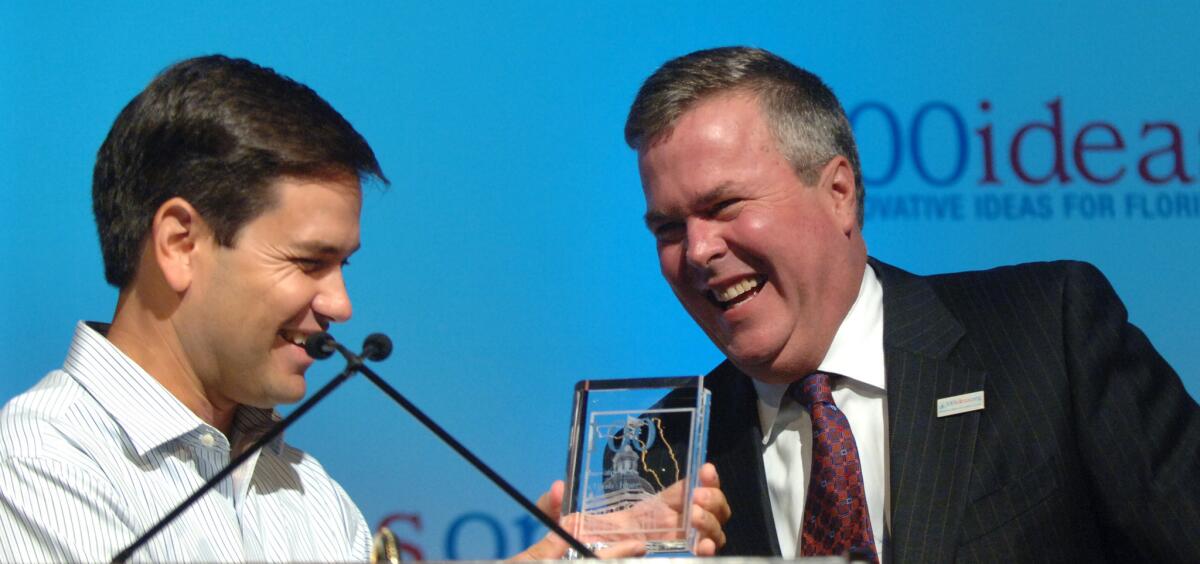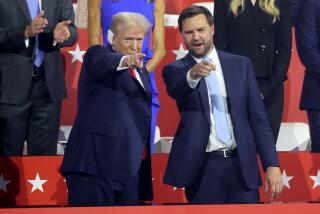Column: The GOP has two contests going on

A photo taken Aug. 11, 2006 shows then-Gov. Jeb Bush laughing as incoming Florida House Speaker Marco Rubio presents him with an award at a Republican policy conference Rubio organized in Orlando, Fla.
To most of us, the Republican presidential campaign looks like an exercise in untrammeled chaos. Ben Carson is surging. Donald Trump is raging. Jeb Bush is floundering. And a long list of others, from Marco Rubio and Ted Cruz to Carly Fiorina, are jostling for position in the polls.
The chaos is real, and it will be on display Wednesday in the candidates’ third televised debate. But there’s also a rough order underlying this contest, at least according to the professional strategists who run several of the GOP campaigns.
At this early stage, they say, we’re not really watching a single campaign for the Republican nomination. Instead, we’re watching two parallel contests to determine who the two finalists will be — one among mainstream conservatives, the other among insurgent conservatives.
At this early stage ... we’re not really watching a single campaign for the Republican nomination. Instead, we’re watching two parallel contests.
Lazy pundits sometimes describe these two wings of the GOP as “establishment” and “tea party,” but that’s not quite right. There’s not much of a functioning establishment any more, and the tea party has evaded definition since its birth.
A more useful description comes from Mark Murphy, one of Bush’s chief strategists. Murphy describes the contest as divided between two “lanes.” There’s a “regular Republican, positive conservative lane,” he said recently; that’s the one that includes Bush, Rubio and John Kasich. And there’s a “grievance lane,” the more visceral conservatism represented by Carson, Trump and Cruz. (Easy to tell which side Murphy’s on.)
Bush was never going to win the semifinal contest in the grievance lane; that’s not who he is. Instead, he’s trying to run as the Republican Party’s best manager of big government agencies, as evidenced by his success as governor of Florida a decade ago.
“He knows how to manage an administration,” his brother, former President George W. Bush, said last week. “I have to believe eventually the American people will say: Who’s had the experience necessary to be president?”
But that’s not the question most Republican voters have been asking. Bush’s managerial conservatism hasn’t caught on. At the moment, he isn’t even winning his own lane.
It’s been an abrupt slide. As recently as July, Bush was in first place in most national polls; now he’s in fourth or fifth place, behind Carson, Trump, Rubio and (in some surveys) Cruz.
That has turned the former governor from an apostle of what he called “joyful” conservatism into a cranky-sounding old guy who can’t figure out why the voters aren’t behind him.
“If this election is about how we’re going to fight to get nothing done, I don’t want any part of it,” he pouted last weekend. “I got a lot of other really cool things I could do other than sitting around being miserable, listening to people demonize me…. That is a joke. Elect Trump if you want that.”
Murphy, Bush’s strategist, says his candidate’s time will come. “He builds slowly and gets better and better,” he told Bloomberg News recently. “He’ll continue to improve.”
Meanwhile, the Bush campaign has begun focusing its fire not on Trump but on the candidate who has surged ahead in the positive lane: Rubio, the 44-year-old senator from Florida.
At a gathering for Bush donors in Houston this week, campaign aides dismissed Rubio as a “Republican Obama” — a first-term senator who looks good and sounds good but hasn’t gotten much done.
But that’s a critique that cuts both ways, conservative writer Bill Kristol noted. “A GOP Obama would be fine,” Kristol wrote Tuesday. “He’d win twice [and] move domestic and foreign policy decisively.”
Rubio hasn’t governed a state, but he has put in serious work trying to update Republican policies. He was part of the Senate group that wrote a comprehensive immigration reform bill in 2013. (He backed out after grass-roots conservatives revolted against the plan; immigration hawks worry that his instincts are still with the reformers.)
He also put forward a proposal to cut taxes on high-income families while providing a big increase in the tax credit for middle and low-income families with children. He’s a conservative, not a moderate, and he appears to be the closest thing to a candidate who can bridge the GOP’s two broad wings.
Rubio hasn’t raised as much money as Bush (nobody has), but he’s raised enough to stay in the race through early spring. So the Florida primary on March 15 could turn into a showdown between the state’s two candidates, Rubio and Bush, from which only one emerges.
The loudest fireworks in Wednesday’s debate may be between the two top grievance candidates, Carson and Trump. But there will be a second contest to watch on the same stage, one that may be more likely to produce the party’s eventual nominee: the battle in the positive conservative lane between Jeb Bush and Marco Rubio.
Twitter: @doylemcmanus
Follow the Opinion section on Twitter @latimesopinion and Facebook
More to Read
A cure for the common opinion
Get thought-provoking perspectives with our weekly newsletter.
You may occasionally receive promotional content from the Los Angeles Times.











